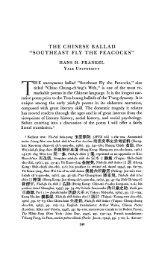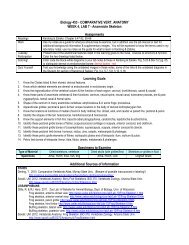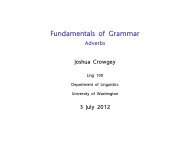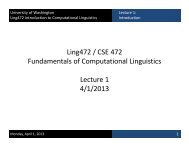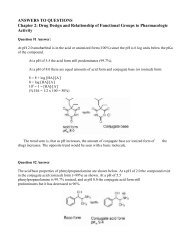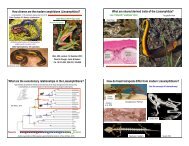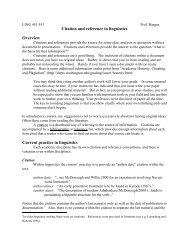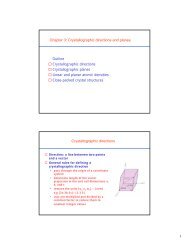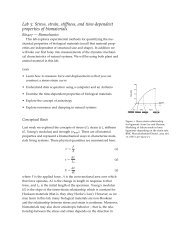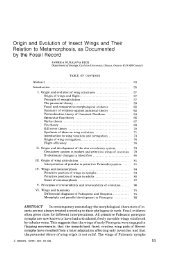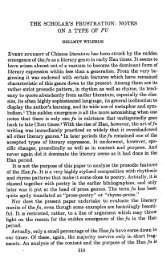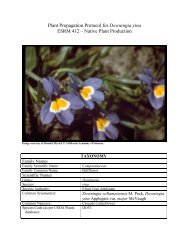Syllabus (Genome 361 Summer 2012) - UW Courses Web Server
Syllabus (Genome 361 Summer 2012) - UW Courses Web Server
Syllabus (Genome 361 Summer 2012) - UW Courses Web Server
Create successful ePaper yourself
Turn your PDF publications into a flip-book with our unique Google optimized e-Paper software.
<strong>Genome</strong> <strong>361</strong>: Fundamentals of Genetics and Genomics <strong>Summer</strong> <strong>2012</strong><br />
Instructors<br />
Frances Cheong, kcheong3@uw.edu<br />
Mary Kuhner, mkkuhner@uw.edu<br />
Teaching Assistants<br />
Renee Agatsuma, ragatsum@uw.edu<br />
Caitlin Scoville, cwscov@uw.edu<br />
Jeff Vierstra, jeffrv@uw.edu<br />
Chad Weisbrod, weisbc@uw.edu<br />
Course overview<br />
Genetics is the scientific study of heredity, and over the last century many genetic methods<br />
have been developed for understanding basic biological processes. However, genetics is<br />
much more than a set of methodological tools. Rather, it provides a coherent framework<br />
for thinking about biology, medicine, and evolution. In addition, genetics permeates our<br />
everyday lives, and chances are that you have already thought about or have been exposed<br />
to genetics-related topics (such as forensics, genetic testing for inherited diseases, human<br />
cloning, stem cell research, and genetically modified foods). A recurring theme of the<br />
course will be how genotypes (the genetic composition of organisms) determine<br />
phenotypes (observable traits or characteristics). The curriculum will cover basic<br />
Mendelian genetics, elements of probability and statistics fundamental to interpreting<br />
genetic data, genetic variation, the use of model organisms in genetics, basic molecular<br />
genetics, and approaches to mapping genes for specific phenotypes or diseases.<br />
Office Hours<br />
Weekly office hours are held at the following times:<br />
Jeff Vierstra Tuesday 11:30am – 12:30pm in Foege S040<br />
Caitlin Scoville Wednesday 8:30 – 9:30am in Foege S040<br />
Mary Kuhner Wednesday 2:30 – 3:30pm in Foege S110<br />
Frances Cheong Wednesday 3:30 – 4:30pm in Foege S110<br />
Renee Agatsuma Thursday 8:30 – 9:30am in Foege S040<br />
Chad Weisbrod Thursday 1:00 – 2:00pm in Foege S040<br />
1
Schedule<br />
Lectures are on Tuesday and Thursday in Foege S060 from 9:40am to 11:10am. Typically<br />
we will take a short break in the middle of each lecture. In addition, all students should be<br />
enrolled in a quiz section that will be held in Hitchcock 443. On the following pages, the<br />
tentative schedule of lecture and quiz section topics for each week is shown. Exam dates<br />
are also indicated. Problem sets will be handed out in quiz section every week, and<br />
answers will be posted on the course website (see below). Although problem sets will not<br />
be graded, we strongly suggest that you work through them each week before the answers<br />
are posted; this will provide an important opportunity to assess your understanding of<br />
material and to prepare for exams. In addition, every Monday a quiz section pre-activity<br />
will be posted on the course website. Do this pre-activity before coming to quiz section.<br />
Week 1<br />
Tuesday, Jun. 19 Lecture 1 (FC) Introduction to genetics; Mitosis and meiosis<br />
What do we mean by Genetics? Cell division; cell<br />
cycle; chromosomal segregation in mitosis and<br />
meiosis<br />
Quiz Section 1 Meiosis<br />
Problem Set 1<br />
Thursday, Jun. 21 Lecture 2 (FC) Mendelian genetics and probability I<br />
Mendelian ratios; principle of genetic segregation;<br />
product and sum rules<br />
Week 2<br />
Tuesday, Jun. 26 Lecture 3 (FC) Mendelian genetics and probability II<br />
Principle of independent assortment; chi-squared<br />
analysis<br />
Quiz Section 2 Mendelian genetics<br />
Problem Set 2<br />
Thursday, Jun. 28 Lecture 4 (FC) Mendelian genetics and probability III<br />
X-linked inheritance<br />
2
Week 3<br />
Tuesday, July 3 Lecture 5 (FC) Central dogma<br />
Transcription; translation; looking for ORFs<br />
No quiz section Central dogma take-home exercise<br />
Thursday, July 5 EXAM 1<br />
Week 4<br />
Tuesday, July 10 Lecture 6 (MK) Mutation and complementation<br />
Loss of function; gain of function; mutagenesis;<br />
complementation<br />
Quiz Section 3 Mutagenesis and complementation<br />
Problem Set 3<br />
Thursday, July 12 Lecture 7 (MK) Epistasis<br />
Genetic interactions and dihybrid ratios<br />
Week 5<br />
Tuesday, July 17 Lecture 8 (MK) PCR & cloning<br />
Molecular methods<br />
Quiz Section 4 Epistasis & molecular techniques<br />
Problem Set 4<br />
Thursday, July 19 Lecture 9 (MK) DNA sequencing<br />
Making a genomic library; DNA sequencing<br />
technology; genome sequencing<br />
Week 6<br />
Tuesday, July 24 Lecture 10<br />
(FC)<br />
Genetic linkage<br />
Testcrosses; genetic linkage; parental and<br />
recombinant types<br />
Quiz Section 5 Introduction to genetic linkage<br />
Problem Set 5<br />
Thursday, July 26 Exam 2<br />
3
Week 7<br />
Tuesday, July 31 Lecture 11<br />
(FC)<br />
Thursday, Aug. 2 Lecture 12<br />
(MK)<br />
Week 8<br />
Quiz Section 6 Cancer genetics<br />
Problem Set 6<br />
Genetic and physical maps<br />
Constructing genomic maps based on<br />
recombination and physical distance<br />
Molecular markers<br />
Tuesday, Aug. 7 Lecture 13 Guest lecture on genetic counseling<br />
Thursday, Aug. 9 Lecture 14<br />
(MK)<br />
Week 9<br />
Tuesday, Aug. 14 Lecture 15<br />
(MK)<br />
Quiz Section 7 Molecular markers<br />
Problem Set 7<br />
Human pedigrees & LOD score analysis<br />
Mapping human genetic diseases using pedigrees<br />
Population genetics<br />
Quiz Section 8 LOD score analysis<br />
Problem Set 8<br />
Thursday, Aug. 16 Exam 3<br />
4
Course <strong>Web</strong>site<br />
A course website has been created and is available at<br />
http://courses.washington.edu/gs<strong>361</strong>sum<br />
Much of the material used in lectures will end up on the class web site, but there may be a<br />
lag of several days. The website also includes a link to a Go Post discussion board that has<br />
been set up for the class. Audio podcasts will be made available for the class. The audio<br />
podcasts, the course website and discussion board should be used to complement lectures,<br />
not as a substitute.<br />
Textbooks<br />
There is no required textbook for this course. Each lecture will be accompanied by a<br />
handout that covers all of the in-class material. For students who would like to have a<br />
general reference book to supplement course material, the following textbooks will be put<br />
on reserve in Suzallo library:<br />
• Griffiths, A. J. F., Wessler, S. R., Lewontin, R. C., and Carroll, S. B. 2008.<br />
Introduction to genetic analysis. 9th ed. W. H. Freeman and Company, New York,<br />
NY. ISBN: 139780716768876<br />
• Hartwell, L. H., Hood, L., Goldberg, M. L., Reynolds, A. E., Silver, L. M., and<br />
Veres, R. C. 2006. Genetics from genes to genomes. 3rd ed. McGraw-Hill, Boston,<br />
MA. ISBN-10: 0073227382<br />
• Klug, W. S., Cummings, M. R., and Spencer, C. A. 2006. Concepts of genetics. 8th<br />
ed. Pearson Prentice Hall, Upper Saddle River, NJ. ISBN: 0131918338.<br />
Grading<br />
The final grade will be determined by exams and participation points for lecture and quiz<br />
sections.<br />
Exams. There will be a total of three exams, each worth 100 points. Exams are not<br />
designed to be cumulative, but they will end up being somewhat cumulative because the<br />
later course material assumes that you understand the earlier material. We will allow you<br />
to bring hand written notes on one 4x6 index card, but that really doesn't mean much—if<br />
you don’t understand the material, having notes won’t be much help. We will give you an<br />
index card to use; it will be handed out during the lecture preceding the exam.<br />
Class participation points. Each lecture will involve several clicker questions. If you<br />
attend at least 9 lectures, as determined by your participation in answering the clicker<br />
questions, you will receive 10 points. Otherwise, you will receive zero points. Having<br />
someone take your clicker to class and click for you when you are not there is a violation<br />
of the Honor Code. We will report any breach of conduct to the University Disciplinary<br />
Board. Both the clicker-giver and the clicker-receiver will be reported. The clicker receiver<br />
channel is 41.<br />
5
Quiz section participation points. If you attend at least 6 out of the 8 quiz sections, you<br />
will receive 10 points. Otherwise, you will receive zero points. You must attend your<br />
registered section to receive credit.<br />
Final grade. The total number of points available is 320 (300 points from exams, 10 points<br />
from class participation, and 10 points from quiz section participation). The curve will be<br />
set so that the median score is a 2.8. The lowest passing grade will be set at half the<br />
median.<br />
Conflict policy. Make-up exams are not automatically given for scheduling conflicts. Our<br />
policy is to allow students to schedule a make-up exam, at the instructors’ discretion, for<br />
only a few reasons:<br />
• Medical/family emergencies. Visiting relatives on their birthdays does not count as<br />
a family emergency!<br />
• Academic events – the student must be interviewing for a job or medical/graduate<br />
school, or presenting academic research that was conducted at the University at a<br />
conference.<br />
• University-sponsored sporting events – the student must be part of a University<br />
sponsored team. University clubs do not count as university-sponsored sports<br />
teams; if in doubt, check with the Athletics department.<br />
Airline reservations do not constitute a valid excuse. If you will need to reschedule an<br />
exam (for one of the reasons listed above), you must fill out an exam conflict form and<br />
return it to Frances by June 21. If an exam is missed because of a medical or other<br />
emergency, there will be NO opportunity to take a written make-up exam after the<br />
scheduled exam date. The instructors may choose to give an oral exam in cases of<br />
unforeseeable emergencies. If you cannot meet the exam schedule, you should not take this<br />
class.<br />
Re-grades. If you feel that an error was made in grading an exam, state your case in an<br />
email to Frances (kcheong3@uw.edu) within one week after the graded exam was returned<br />
to you. We reserve the right to re-grade the entire exam, not just the question in contention.<br />
6
Code of Conduct<br />
Honesty is a highly valued principle in science. In <strong>Genome</strong> <strong>361</strong> we strive to create an<br />
environment where individual achievement and honesty are rewarded. In this spirit, we<br />
expect that each student will do his or her own work on exams and only use a clicker when<br />
present in class. During exams and lectures, we will circulate to answer your questions. If<br />
we observe behavior that does not meet our standards of honesty, we will take actions to<br />
remedy the situation (e.g. by taking exams or clickers away). For these reasons, please<br />
keep your eyes on your own paper and do not give your clicker to another student. We<br />
reserve the right to report any breach of conduct to the University Disciplinary Board. If<br />
they find that an infraction has occurred during an exam, the exam in question will be<br />
given a zero. As a further deterrent to altering exams after they are graded, and as an aid<br />
for grading them rapidly, we keep photocopies of exams. Please refer to the University’s<br />
Policy on Academic Honesty if you have questions about the code of conduct.<br />
Please be aware that university email is not considered a secure way to communicate<br />
private and sensitive matters. If you wish to discuss confidential matters related to the<br />
course, please set up an appointment with the instructors.<br />
7



